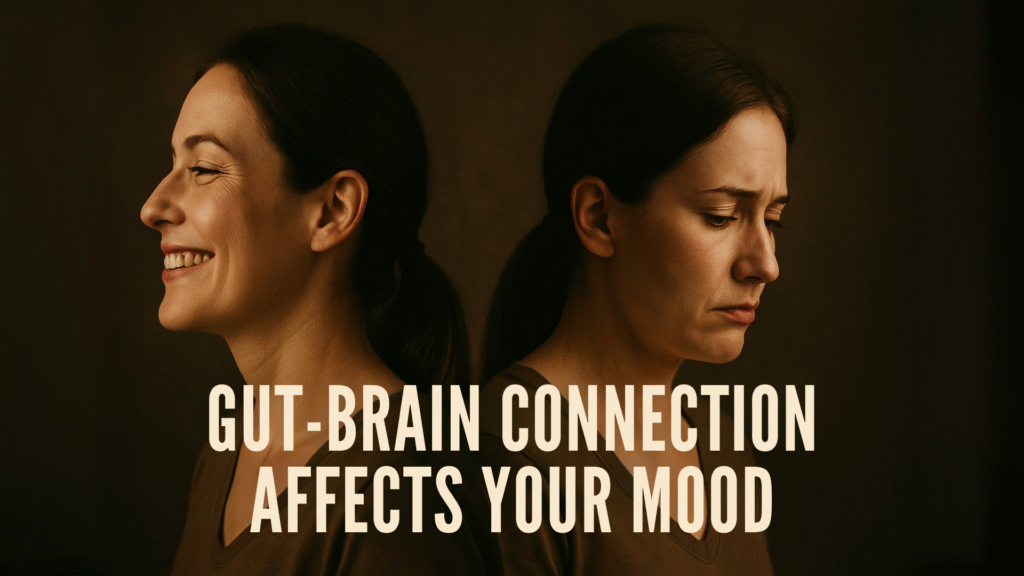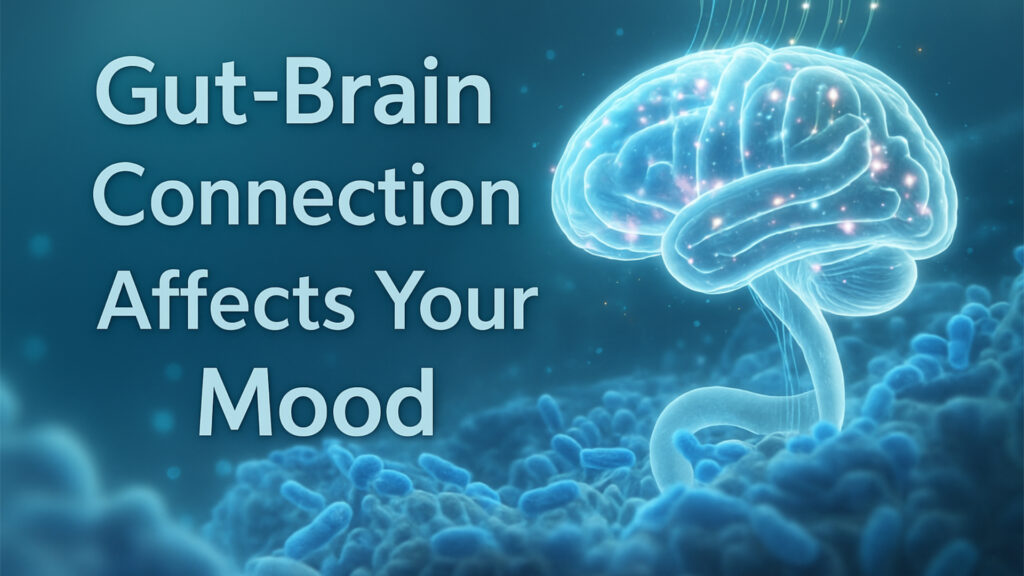The gut-brain connection affects your mood. This fascinating link between our gut and brain plays a crucial role in our mental and emotional health. Scientists have found that the gut-brain connection is key in managing mood and overall mental well-being.
Our digestive system is more than just a food processor. It talks to our brain through a network of nerve cells. This is called the “second brain” in our gut. It affects our emotions and how we handle stress.
Studies show a healthy gut can help with mood swings and improve thinking. The balance in our microbiome is crucial. It helps make neurotransmitters that control our emotions and focus.

Understanding the Enteric Nervous System and Its Impact
The human body has a complex network of nerve cells in the digestive system. It’s called the enteric nervous system. Often called the “second brain,” it controls digestion and talks to the main nervous system.
The enteric nervous system has millions of nerve cells along the digestive tract. These cells can send signals on their own. They manage digestion without needing the brain’s help. They also make up to 95% of the body’s serotonin, which affects mood and feelings.
What Makes the ENS Unique?
The gut and brain talk to each other through the vagus nerve. This creates a strong two-way communication. It’s why emotions can affect digestion and why gut issues can change our mood.
Digestion and Neural Control
The enteric nervous system handles important digestive tasks. It controls muscle movements, enzyme release, and nutrient absorption. Problems with gut-brain communication can lead to issues like irritable bowel syndrome. This can cause emotional and physical problems.
Nerve Cells and Communication
Nerve cells in the digestive system are like messengers. They watch and respond to changes in the gut. They make neurotransmitters that help control digestion and can affect mental health and emotions.
Gut-Brain Connection Affects Your Mood
Scientists are finding interesting links between gut health and mental well-being. The gut-brain axis is a complex network that affects mood disorders. Research shows that irritation in the gut can send strong signals to the brain, possibly causing depression and anxiety.
Serotonin, key for mood regulation, is mainly made in the gut. About 90% of our serotonin comes from the gut. This shows how important digestive health is for our mood.
Stress and anxiety have a two-way effect on gut health. Chronic stress can upset the gut microbiome, leading to inflammation and mental health issues. On the other hand, gut inflammation might make us feel more anxious and emotionally unstable.
New studies suggest that better gut health could help manage mood disorders. People with irritable bowel syndrome (IBS) and other gut problems often face mental health issues. This shows how closely our digestive and mental health are connected.
Learning about the gut-brain connection helps us see mental health in a new light. By improving our diet, managing stress, and taking care of our gut, we can fight depression and anxiety. This approach supports our mental health in a holistic way.
The Microbiome’s Role in Mental Health
The link between gut bacteria and mental health is very interesting. Our gut microbiome is a complex mix of bacteria in our digestive system. It greatly affects our emotional and psychological health.
How Gut Bacteria Influence Brain Function
Gut bacteria talk to our brain in many ways. They make neurotransmitters like serotonin, which helps control our mood. Studies show that good gut bacteria can send signals to our brain. This can help with anxiety and depression.
Impact of Diet on Microbiome Health
What we eat is key to a healthy gut microbiome. Bad foods like processed and sugary ones can harm our gut microbes. But, eating foods full of nutrients helps our good bacteria grow. This supports our mental health.
Probiotics and Mental Well-being
Probiotics are good for our mental health. Research shows that certain probiotics can lower inflammation and help us feel better emotionally. They help balance our gut microbes, offering natural help for mental health issues.
Conclusion
Understanding the gut-brain connection shows how important gut health is. We can improve our gut health by making smart food choices and lifestyle changes. The Mediterranean diet is a great way to keep our gut healthy, focusing on whole foods and avoiding processed ones.
Eating fermented foods like yogurt and sauerkraut boosts our gut’s health. Foods rich in probiotics and prebiotics help keep our gut and mind in balance. Exercise and diet together help manage stress and improve our mood.
Starting small is key to better health. By focusing on gut health through good nutrition, exercise, and professional help, we can connect our gut and mind better.

Ramon Mascarenas is the owner of PalmLeaf Massage & Wellness. Jen Mascarenas is his wife and a vegan who believes in a whole-food, plant-based diet to promote vitality. She shares vegan recipes and writes abstract research articles for PalmLeaf Massage & Wellness. Ramon Mascarenas and his associates have licensed massage therapists who practice Myofascial Trigger Point Therapy and other medical massage modalities. Their services expanded along with Acupuncture, Chiropractic care and Cryo Body Sculpting to promote wellness and help clients with pain management through self-care exercises.
Book now at https://palmleafmassage.com. If you have any questions, please call us at 847.961.4800





